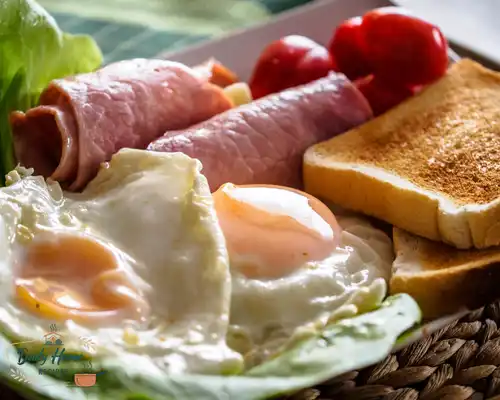Protein is having a moment. It’s splashed across every label, loaded into smoothies, and somehow sneaking its way into cereal and even water. But amidst all the hype, there’s a quiet confusion that a lot of us feel especially if you’re trying to eat well without counting every gram: How much protein do I actually need? And is there such a thing as too much ?
If you’ve ever toggled between “I need to build muscle” and “Wait, am I overdoing it ?” you’re not alone. The answer isn’t a one-size-fits-all number. It shifts depending on your activity level, your goals, your hormones (yes, really), and even how you feel about tracking food in the first place.
This guide breaks down the science in real talk. No macros calculator overload, no guilt-tripping. Just practical insights tailored to real women whether you’re lifting heavy, doing yoga twice a week, or just trying to stop snacking through exhaustion.
Here’s what we’ll unpack:
The recommended protein intake (and why the RDA might be lowballing you)
How to track without spiraling into obsession
Adjusting your protein based on workout vs. rest days
What “too much protein” actually looks like and when to worry (spoiler: rarely)
It’s time to take protein off its pedestal and make it make sense for your body, not someone else’s meal plan.
Recommended Daily Protein Intake for Women
Let’s just get this out of the way: the official protein recommendation for women that tidy little 46 grams per day is kind of a joke. It’s not wrong, technically. But it’s like giving someone a single sock and calling it an outfit. That number is the minimum to keep your body from falling apart, not the amount that actually helps you thrive.
If you’re someone who moves regularly, has a stressful job, works out here and there, or just wants to feel steady and strong you probably need more. A lot more.
Now, the internet loves formulas: “Eat 0.8 grams per kilo,” or “1 gram per pound!” Cool, but here’s what that actually means in real life:
- If you sit most of the day and barely exercise, that 40–50g range is a decent floor.
- If you walk a lot, do yoga, or have a toddler who uses you as a jungle gym? You’re looking at more like 70–90g.
- Lifting weights a few times a week? 90–120g is where most women feel noticeably better energy, recovery, even mood.
- Marathon training or serious strength work? You might need up to 130g, but it’s not about chasing numbers. It’s about listening.
The goal here isn’t to hit some ideal macro badge it’s to feel better. To wake up less sore, snack less out of nowhere, and maybe stop crashing at 3 PM.

The Problem With “Just Eat More Protein”
Let’s be real: eating enough protein isn’t always easy. Especially if you grew up on cereal and pasta and the occasional sad chicken breast. It feels… unnatural at first. And sometimes a little forced. That’s normal.
Some common traps I see (and have done myself):
- Assuming you’re fine because you eat “healthy” clean eating isn’t the same as protein-rich.
- Thinking protein = meat Greek yogurt, lentils, eggs, edamame, protein oats, cottage cheese. It adds up in layers.
- Fearing you’ll “bulk up” You won’t. Pinky swear. Protein isn’t a switch that turns you into a linebacker. It’s more like a quiet background crew keeping your body humming.
What if I don’t want to track grams?
That’s okay honestly, most people don’t. Try this instead: make sure every meal has something solidly protein-ish. Not just a sprinkle of cheese or a spoon of peanut butter. Like an actual base eggs, tofu, beans, fish, whatever you like. Do that three-ish times a day and you’ll be way closer than you think.
FAQ : But isn’t 100g of protein a lot?
It sounds like a lot. Until you realize one single scoop of protein powder is around 20g. A cup of Greek yogurt? 17g. A chicken thigh? 25g. It’s less “eat a steak at every meal” and more “build layers of protein throughout the day.” It adds up quietly and you’ll feel it when it does.
How to Track Without Obsession
Let’s be real tracking macros can mess with your head.
What starts as a way to “be mindful” can spiral into constant mental math, guilt when you eyeball portions, and that weird moment where you’re standing in the kitchen thinking, “I don’t even know if I’m hungry or just trying to hit a number.” Sound familiar?
That doesn’t mean tracking is bad. But the way we approach it? That matters.
When It Helps and When It Starts to Feel Like Too Much
Tracking can be useful if you’re:
- Trying to learn what’s actually in your food
- Struggling to eat enough protein (it’s sneakily hard)
- Working toward a specific fitness or recovery goal
But it’s not a life sentence. It’s a tool, not a lifestyle. If you start feeling anxious about going out to eat, or like your day was a failure because your macros didn’t “balance,” that’s your cue to step back.
Honestly, no one wants to live in a spreadsheet forever. And your body isn’t an Excel formula.
Gentle Ways to Stay Aware (Without Counting Everything)
If full-on tracking stresses you out, try one of these lower-pressure methods:
- The “protein anchor” method: Just make sure each meal starts with something protein-rich. Not perfect, just present.
- Use your hand: A palm-sized portion of protein 2–3x/day = a great baseline.
- Snapshot check-ins: Take a photo of your meals instead of logging them. You’ll start to spot patterns without nitpicking grams.
- Theme your meals: Think “protein + veg + carb” rather than numbers. It builds intuitive balance.
And above all skip the shame loop. You don’t owe anyone a macro breakdown, and your worth has nothing to do with your food log.
FAQ : What if I stop tracking and totally lose control?
Totally valid fear. But here’s the truth most tracking apps won’t tell you: when you stop counting, your body doesn’t suddenly forget what balance feels like. Yes, there might be a bumpy few days. But if you stay curious instead of critical, your natural cues come back online. And honestly? That’s where the magic happens when eating feels like living, not managing.
Adjusting for Fitness or Rest Days
Your body’s not a machine. You’re not burning fuel at the same rate every day so why would your protein needs stay static?
Still, here’s where a lot of people get tripped up: they eat high-protein when they “earn it” with a workout… and skimp on the days they rest. But recovery is when protein does some of its best work.
Do You Need More Protein on Workout Days?
Probably but not because you need to “feed the burn.” The real reason? Your muscles are in repair mode. You break them down when you train, but you build them back stronger in the hours and days that follow.
Here’s a gentle rhythm to consider:
- Workout days: Aim for the higher end of your range (think 0.8–1g per pound of body weight). Space it out across your meals especially post-workout.
- Rest days: Don’t dial it all the way down. Recovery still needs building blocks. Maybe slightly less, but still intentional.
This isn’t about being precise. It’s about being supportive.
What About the Days You’re Just… Tired?
Let’s be honest some days aren’t “planned rest days,” they’re I didn’t sleep well, and my brain’s fried days. And on those days? Protein still matters.
In fact, a solid dose of protein can help stabilize mood, reduce stress-eating, and keep you from swinging between coffee highs and carb crashes. So even if you’re not moving much, fueling well can keep your internal world steadier.
Sample Pattern: 3-Day Protein Flow
Just to paint the picture here’s a non-obsessive flow:
- Day 1: Strength training day → ~100–120g protein
- Day 2: Rest day (lots of sitting) → ~80–100g
- Day 3: Walk + mobility → ~90–105g
Nothing rigid. Just rhythms. Like listening to your body and your schedule.
FAQ : Will I gain weight if I eat high-protein on rest days?
Nope. If anything, your body’s using that protein to repair, balance hormones, and protect lean muscle. Gaining weight from eating protein on a rest day is kind of like blaming your comfy sweater for making you tired it’s not how the body works. Trust the recovery process. It’s where strength is actually built.
FAQ: What’s Too Much Protein?
Let’s talk about the little voice in your head that whispers, “Is this too much?” You’ve upped your protein, you’re feeling better… but now you’re wondering if there’s a limit if somehow you’re tipping into the danger zone.
It’s a fair question. And the internet hasn’t exactly been chill about it.
First, the Kidney Myth (Let’s Retire It)
You’ve probably heard that too much protein “damages your kidneys.” That idea came from old studies on people who already had kidney disease not healthy folks eating more chicken and yogurt.
If your kidneys are functioning normally, you’re fine. There’s no solid evidence that high-protein diets are harmful in healthy women In fact, many studies show benefits for muscle maintenance , blood sugar regulation, and even weight stability.
That said more isn’t always better.
What Actually Is Too Much?
It’s hard to define an exact ceiling, but here’s a real-world guide:
Eating 2g of protein per pound of body weight consistently? Probably overkill.
Slamming back 4 shakes a day just to hit some arbitrary number? Not necessary.
Feeling bloated, heavy, or mentally stressed by your protein intake? That’s your sign.
Your body will usually tell you when it’s had enough with subtle signs like:
Digestive discomfort (not the good kind)
Constant thirst or fatigue
Feeling overly full or turned off by the idea of more food
Protein should feel supportive, not overwhelming.
TL: DR So, What’s the Sweet Spot ?
For most women, 0.7 to 1g per pound of body weight is safe, effective, and totally doable with whole foods and the occasional shake. Anything well beyond that? Unless you’re a bodybuilder or in a clinical setting it’s probably unnecessary.
Here’s the vibe: if you’re eating enough to feel energized, sleep well, recover, and still enjoy your meals you’re not overdoing it.
FAQ : Can too much protein turn into fat?
Not easily. Protein is the least likely macro to be stored as fat because your body works hard to break it down. It’s metabolically expensive. If you’re gaining weight, it’s more likely due to total calorie intake or other factors not protein alone. So no, your salmon isn’t making you gain fat. You’re good.
You Don’t Have to Perfect This

Honestly? It’s okay if you still feel a little unsure.
This whole “how much protein” thing it’s a moving target. And the truth is, you’re probably doing better than you think. Most women aren’t trying to get jacked or win a macro contest they just want to have energy, not feel sore all the time, and maybe not crash by 3PM every day. That’s more than valid. That’s wise.
You don’t have to weigh chicken breasts or panic over grams. You don’t have to be militant about macros to be intentional. Some days it’ll look like hitting 100g of protein with zero effort. Other days, cereal wins. That’s not failure it’s just life.
The goal here isn’t control. It’s connection to your body, to how food makes you feel, to what enough looks like for you, not some fitness influencer’s full day of eating.
So yeah, learn the numbers if you want. Try the meal prep if it helps. But also? Let it be easy sometimes. Let it be imperfect. Let it be yours.
You’re not a macro. You’re a whole person. And that matters more than anything.


Leave a Reply to High-Protein Dinner Routines That Fit Real Life Cancel reply